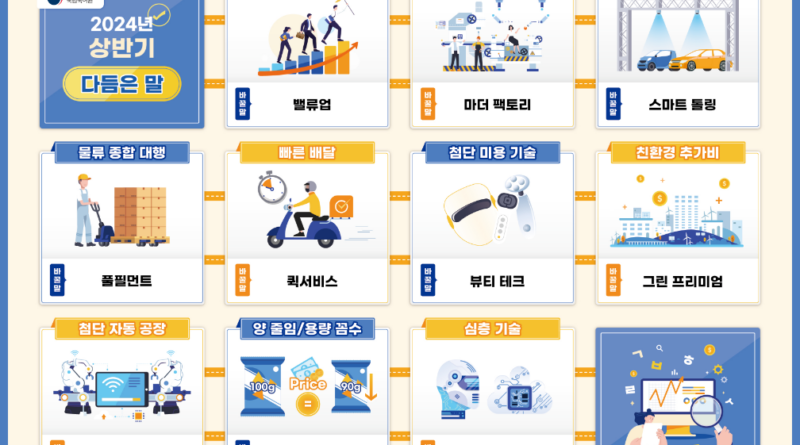Ministry of Culture, Sports and Tourism and National Institute of the Korean Language announced by refining 23 foreign languages introduced into society in the first half of 2024 into easy-to-understand Korean.

From March to June 2024, after six expert meetings (Saemal Meeting) and a public acceptance survey, ‘Value Up’, ‘On-Device AI’, and ‘Flur’ were developed through deliberation and resolution by the Korean Language Purification Subcommittee of the Korean Language Deliberation Council. 23 foreign words such as ‘Ting’ were replaced with easy Korean words such as ‘improve value’, ‘device-type artificial intelligence’, and ‘show affection’.
The word most positively evaluated by the public in this announcement was ‘value improvement’, with approximately 90% of respondents choosing this word. ‘Value improvement’ means that a company or organization increases its value through various methods such as products, services, systems, and organizational culture. This is a Korean term that refines ‘value up’ to make it easier to understand. In addition, people also chose well-refined Korean terms such as ‘smart tolling (automatic fee collection)’, ‘fulfilment (comprehensive logistics agency)’, and ‘beauty tech (advanced beauty technology)’.
The Ministry of Culture, Sports and Tourism and the National Institute of the Korean Language discuss at the ‘Saemaul Group’, which is comprised of various experts from the media, academia, and university students, in order to quickly refine and provide unfamiliar foreign language terms that are highly public or closely related to people’s lives into Korean. This ‘New Language Meeting’, operated by the National Institute of the Korean Language since 2019, has been integrated with the existing ‘Stuttering Committee’ since 2020. Since 2019, 360 new terms have been selected and distributed, including ‘booster shot’, ‘kitchen special’ (omakase), and non-branded (non-label).
Every two weeks, the ‘New Word Meeting’ prepares 3 to 4 candidates for terms that need to be refined, and then makes a decision after conducting a public acceptance survey. Starting this year, we plan to further refine and spread the terminology through deliberation by the Korean Language Purification Division of the Korean Language Council. Additionally, terms refined to date can be found in ‘Refined Words’ on the website of the National Institute of the Korean Language (http://www.korean.go.kr).
The Ministry of Culture, Sports and Tourism and the National Institute of the Korean Language plan to continue efforts to quickly discover and refine new foreign words and inform the public of them in order to promote the use of Korean language that the public can easily understand.
Editor. Seyeong Hong








